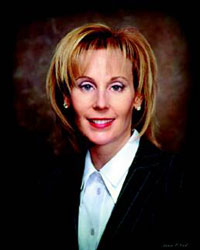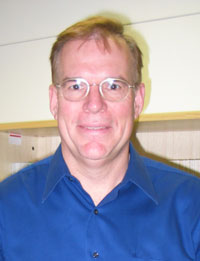 |
Gail Werner-Robertson |
 |
Wayne Fisher, Ph.D. |
The bill, LB 482, is under consideration for signature by Gov. Dave Heineman. If signed into law, the bill would provide much needed funding for families with autistic children.
A key supporter of the bill is Gail Werner-Robertson, founder and CEO of GWR Wealth Management LLC and the mother of two autistic sons, Jared, 21, and Cleighton, 14.
Under the bill, the GWR Sunshine Foundation will provide at least $1 in matching funds for every $2 the state contributes to the Autism Treatment Program Cash Fund.
The bill will allow families without abundant financial resources to get the early intervention treatment their autistic children need at the Munroe-Meyer Institute Center for Autism Spectrum Disorders at UNMC.
“This is going to greatly increase our ability to provide services to young children with autism at an intensity level that will really make a difference in their lives,” said Wayne Fisher, Ph.D., director of the MMI Center for Autism Spectrum Disorders.
To receive the vital early intervention their child needs, some families spend as much as $60,000 per year and sometimes even bring in therapists from out-of-state, Dr. Fisher said.
Looking for ways to help families dealing with autism is nothing new for Werner-Robertson. For the sixth consecutive year, she and her husband, Scott Robertson, are chairing a dinner and golf tournament to provide funding for the MMI autism program.
“I have been motivated each and every day to help other families
struggling with autism,” Werner-Robertson said. “As I have had the joy of watching my own boys succeed in the pursuit of their dreams, it energizes me to bring this hope to others. Hopefully we will succeed in making a difference
in some very special children’s lives.”
This year’s dinner will be June 3 at the Holland Performing Arts Center. The golf tournament will be June 4 at Shadow Ridge Country Club.
Three musicians with links to autism will perform at the dinner. They include: Tony DeBlois, a 32-year-old pianist from Randolph, Mass., who is a blind, autistic savant; Charlie Adams, Nashville, Tenn., the lead drummer for Yanni for more than 20 years whose family has been touched by autism; and Matt Savage, a 14-year-old autistic savant jazz pianist from Sudbury, Mass., who is able to read music backwards.
The June 3 event will begin with a cocktail reception at 5 p.m., followed by dinner at 6 p.m. and an oral auction at 7:30 p.m. The concert featuring the three musicians will follow the auction. The golf tournament will be a four-person scramble with a 1 p.m. shotgun start.
Back by popular demand to speak at this year’s dinner will be Nick Stuart, who is just finishing his freshman year at Westside High School. Stuart, who is autistic, brought down the house at last year’s dinner when he talked about his passion for wrestling and the World Wrestling Entertainment (WWE).
The MMI Center for Autism Spectrum Disorders has taken significant strides in the past year — thanks in large measure to the support of the GWR Sunshine Foundation. Last November, MMI opened a state-of-the-art facility for taking care of children with autism.
In addition to Dr. Fisher, three other faculty have been hired and the Center for Autism Spectrum Disorders now has 30 total staff, including multiple support therapists and research assistants.
New faculty include: Dr. Fisher’s wife, Cathleen Piazza, Ph.D., who takes care of children with serious eating disorders; Hank Roane, Ph.D., who administers MMI’s program for autistic children with severe behavioral problems; and Tiffany Kodak, Ph.D., a post-doctoral fellow at MMI who has accepted a full-time faculty position after she completes her fellowship.
“This wouldn’t have been possible without the support of the GWR Sunshine Foundation and Gail Werner-Robertson,” Dr. Fisher said. “This support has enabled UNMC to go from having a non-existent autism program to having one of the better autism programs in the country.”
Dr. Fisher noted that current data indicates that 1 in every 150 children has autism. This is up from1 in 166 children last year.
“The diagnostic criteria have become more inclusive,” he said. “Parents, pediatricians and schools are doing a much better job of identifying autistic children. Much of this is due to the increased awareness of autism in the media.”
Two prominent individuals will be recognized at this year’s dinner — C.L. Werner, Gail’s father and chairman of the board of Werner Enterprises, one of the five largest truckload carriers in the United States; and Dick Holland, a retired Omaha advertising executive who is one of the leading philanthropists in the community. Both Werner and Holland have made major contributions to the GWR Sunshine Foundation.
John and Lynne Boyer will serve as honorary chairpersons for the June 3 dinner. John Boyer is a partner in the Omaha law firm of Fraser Stryker Meusey Olson Boyer & Bloch, PC. Lynne Boyer, one of the daughters of Omaha philanthropist, Chuck Durham, is a leading community volunteer.
For more information on the dinner and golf tournament, contact Bridget Cannon-Hale, GWR Sunshine Foundation, 402-496-7200, or go online to www.gwrsunshinefoundation.org.
More facts about autism
- One in 150 children is diagnosed with autism
- One in 94 boys is on the autism spectrum
- 67 children are diagnosed per day
- A new case is diagnosed almost every 20 minutes
- More children will be diagnosed with autism this year than with AIDS, diabetes and cancer combined
- Autism is the fastest-growing serious developmental disability in the United States
- Autism costs the nation over $90 billion per year, a figure expected to double in the next decade
- Autism receives less than 5 percent of the research funding of many less prevalent childhood diseases
- Boys are four times more likely than girls to have autism
- There is no medical detection or cure for autism
Incidence vs. Private Funding
- Leukemia: Affects 1 in 25,000 people / Funding: $310 million
- Muscular Dystrophy: Affects 1 in 20,000 / Funding: $175 million
- Pediatric AIDS: Affects 1 in 8,000 / Funding: $394 million
- Juvenile Diabetes: Affects 1 in 500 / Funding: $130 million
- Autism: Affects 1 in 150 / Funding: $15 million
National Institutes of Health Funds Allocation
- Total 2005 NIH budget: $29 billion — of this, only $100 million supports autism research. This represents 0.3 percent of total NIH funding.